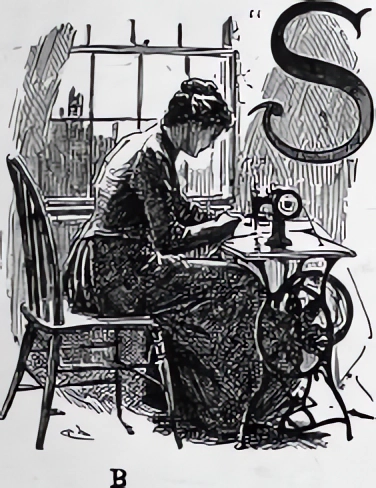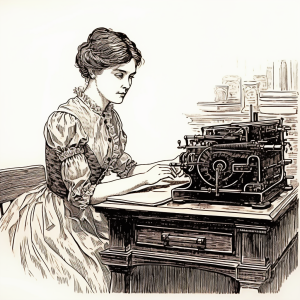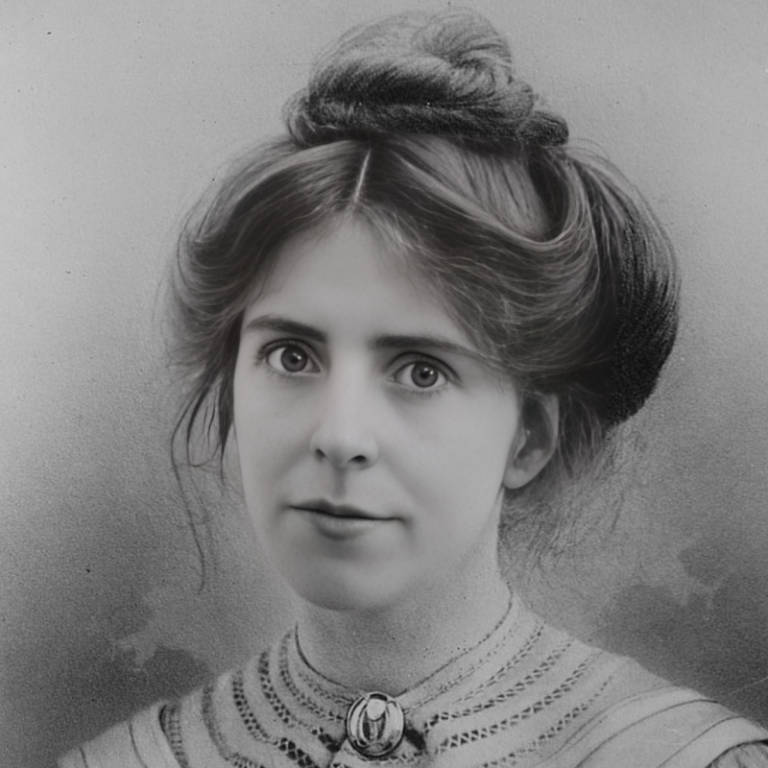In Cap and Apron
CHAPTER I.
“LIBERTY” AND “INDEPENDENCE.”

“STITCH! stitch! stitch!” I stood in the doorway of a fifth-floor back-room in a Camberwell lodging-house, listening to a modern edition of “The Song of the Shirt,” sung to the accompaniment of the sewing-machine. The scenery was similar to that painted by Thomas Hood half a century ago. The woman and the unwomanly rags, the crust of bread, the table, the straw, and the broken chair, all were there. The singer of the song sat at the machine, her head bent over the work which her hands were guiding, while her feet pushed the treadle up and down. I looked on until my brain grew weary with the monotony of her movements and the grating noise of the unlubricated wheel.
“How much do you earn a day at that work?” I asked.
“Eighteenpence, Miss,” was the answer.
“And you pay for your lodging, food and clothes, all with that eighteenpence?”
“Yes, Miss.”
“But is there no other work you can do — nothing that is less wearing on body and brain?”
“Nothing, Miss. Some other girls that write a good hand get work in the City at £1 a week, and some that are quick at figures earn almost as much in the shops; but I can only sew. I bought my machine on time, and it’s not paid for yet. Excuse me, but I must be on with my work.”
Stitch! stitch! stitch! The noise commenced again.
“Stop! “I cried. “I have it. I will help you. “Can you do housework ? “
Why, yes, Miss, I suppose so,” she answered, with wondering eyes.
“Then fix yourself up a little and come with me. I will give you a place as housemaid in my home. What you don’t know, you will soon learn. You shall have a nice clean bedroom, with plenty to eat, print dresses in the morning, black stuff in the after-noon, with white caps and aprons, and collars and cuffs. I will buy them for you as we go along. We will pay you £16 a year to commence. Come, why don’t you get your things on? We will settle up the back rent and return the sewing-machine to the instalment people.”
The girl had risen from her chair and, to my astonishment, confronted me angrily, her cheeks aflame and her eyes blazing.
“Did you come only to insult me?” she demanded, stamping her feet. “I go out to service! I wear caps and aprons, those badges of slavery! No, thank you. I prefer to keep my liberty and be independent.”
What was she talking about? Her liberty, her independence ? I was bewildered, and could scarcely believe my ears. I had been so interested in this girl, and for the past two months had vainly tried to think of a plan whereby I could help her. I knew she was poor and proud, and would not take a penny from me unless she felt she had earned it. I had finally decided to give her a comfortable situation in my own home, and this was the way she received my suggestion. She had deemed my offer an insult. So this was the outcome of my maiden effort in the missionary line! She had asked for bread, and I, according to her way of thinking, had proffered her a stone. Disconsolate and disappointed, I left her, and in my bitterness was half resolved to steel my heart for ever against the woes of my own sex, and never again venture outside the legitimate paths of journalism.
However, my cynical resolution was not carried out, for the following day I was seized with a womanly curiosity to learn something more about this wonderful “liberty” the sewing girl seemed to value so highly; and, with that in view, I passed considerable time among the working women of London, trying to gain a clue to the meaning of their war-cry, “Independence.” Everywhere I heard that word. It sounded above the clickety-clack of the type-writer while the fingers flew over the keys; the noisily-turning factory-wheels failed to drown it; I heard it over the clink of the barmaid’s glasses; it mingled with the ring of the telephone-bell, the whirr of the cash-machine, and the refrain of the chorus-girl. The telegraph operator murmured the word as she took down the letters of the various messages, the schoolmistress whispered it as she gave out the morrow’s lesson in arithmetic, the female bookkeeper uttered it while she added up the long column of figures. Even the little sub-editress, earning a salary of £ I a week for stealing copy from the daily journals, seemed imbued with that so-called “spirit of independence.” “Give me my liberty and independence! “That was the burden of their song. Some of them belonged to “The Independent Young Ladies’ League,” some to a “Liberty Club,” others to “The Society for Promoting the Equality of Classes,” and the rest were members of various societies and orders with similar names, while all prated of liberty and freedom like Young America just let loose.
Their ideas seemed to be vague and wandering, and the majority of them were hardly able to give a proper definition of the word they used so glibly.
They were not a cheerful lot of girls by any means. Indeed, their solitary happiness was apparently in the belief that they were independent. Some of them were what are generally termed “ladies by birth,” others were ladies by education. Each individual girl rejoiced in the appellation “young lady,” whether she were a visiting governess or a clerk in a tobacco shop. They worked early and late at their professions and trades, and their salaries varied from 6s. to 30s. a week. They supported themselves, and often had several younger brothers and sisters dependent upon them. Week after week, month after month, and year after year, they had toiled with little advancement or encouragement Most of them belonged to the commonplace order, neither clever nor stupid, only ordinary, everyday young women, working for their living. Many were hungry, some were badly clothed, few had comfortable beds or clean lodgings. A number of them had porridge for breakfast and watercress for supper, with no midday meal. One young woman assured me that boiled rice was her perpetual diet, and that, while it was filling, it became tiresome in the long run. But, despite these numerous inconveniences, they were all “independent” girls, every one of them. Several times I broached the subject of domestic service as a possible release from their troubles, but they laughed me to scorn and flaunted the flag of liberty in my face. What! go to service? Not they! Why, they could only have one night off each week, and no followers. Besides, who could wear caps and aprons without despising herself?
I began to wonder if there really could be anything terrible connected with domestic service which should make these poor girls so shrink from it. For myself, I knew little or nothing about housework, but the belief that there was nothing incompatible between gentility and domestic work had always been a hobby of mine. Why could not a refined English girl wash dishes, make beds, and roast a leg of mutton just as well as a member of the lower classes? Wherein would she demean herself by doing this work and receiving wages for the same?
But there were the caps and aprons. Could an educated girl wear them without diminishing her self-respect? Why was not a housemaid’s cap just as respectable as that worn by a “lady nurse”? For my own part, I had always insisted that no Paris milliner could manufacture any headgear more becoming to the majority of women than the white ruffled cap of the domestic servant employed by members of the upper classes. A pretty maid, to my mind, was much prettier with a cap than without one, while the face of an ugly girl was also improved by it. But these “slavery badges,” I was told, were not the only bugbears of the servant-girl.
I had a curiosity to find out just what these trials were, and to discover why this service was looked upon with so much contumely. As a mistress, however kind and considerate I might be, it was impossible for me to get a perfect understanding of the inner working of the household machinery. There was only one way to get at the root of the matter, and that was to go out to service myself.
I arrived at this decision one morning in the latter part of August, and I no sooner decided than I began to make preparations for my campaign. I first purchased some goods for a print dress, which I had made up in the prevailing style for housemaids, together with a black serge gown for afternoon wear. Then I bought three linen aprons for morning, and as many fine muslin ones for dress-up occasions. They were prettily trimmed with embroidery, and the ruffled epaulettes were a joy to behold. Cuffs and collars and caps with long streamers completed my outfit. Then I hired a room in Camberwell for 2s. 6d. a week, where I might have letters addressed, and arrangements were made with a titled friend to give me a reference as to respectability and honesty.
Until all these details were settled, I gave little thought as to how I should get the situation I desired, nor the difficulties I should be likely to encounter. I had a nineteenth-century woman’s confidence in my ability to accomplish whatever I should set out to do, and the remembrance of my first and only attempt at sweeping a floor (which left me with blistered hands) did not in the least daunt my spirit. I should never have been tempted to call myself a domesticated woman, and my experiences in household duties, so far as the actual work might be concerned, was very limited; yet I prided myself upon my abilities in the “knowing how” line. If I had never washed dishes, I knew how they ought to be done; and I was thoroughly convinced that dish-washing, sweeping, dusting, making beds, and “turning out” rooms, could be reduced — or, rather, elevate — to a science. I felt sure that in all kinds of work there were hard methods and easy ones. By going out to service I should discover which was which, and then I should be able to write a series of articles on “Housework Made Easy,” thus benefiting womankind in general and servant-girls in particular. In order to inform myself as to just where my valuable services were required, I picked up the morning paper and looked among the ” Situations Vacant.”
WANTED. — Housemaid where Parlourmaid is kept; must be neat, of good appearance, tall, and thoroughly capable, with at least twelve months’ character.
It was evident that I would not suit that advertiser, for I was not tall, neither was I possessed of a twelve-months’ character. I proceeded down the column, and to my utter dismay I found that length of body, as well as length of character, was considered indispensable in a housemaid or parlourmaid. There were several places open to ” generals,” but most of them were required to look after the babies, besides doing the other work, and I felt unequal to the task. Cooks were in great demand, but they also must needs have long characters.
Still, I did not lose heart, but bearing in mind the motto of the Americans, “Trust in the Lord and advertise,” I wrote out an advertisement and took it to a newspaper office in Fleet Street. As I handed it to the receiving clerk, I observed that a puzzled look overspread his features. My notice was apparently something of a novelty to him, for, after rereading it, he took it across the room to another clerk, who, when he had read it, smiled, and said, “It’s all right. Put it in.” The next morning — August 23rd — there appeared in the columns of “Situations Wanted” the following:—
AS Housemaid, Parlourmaid, or HouseParlourmaid. — A refined and educated young woman, obliged to earn her living, and unable to find other employment, wants situation as above. Expects only such treatment as is given to servants. Will wear caps and aprons, but would not wish to share bed with another. Thoroughly reliable and competent. References; town or country. Wages, £14.— Address —.



